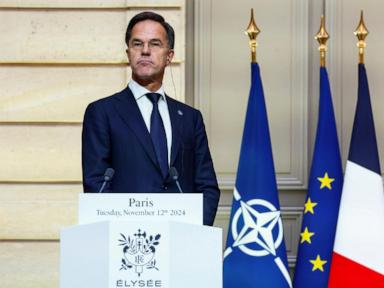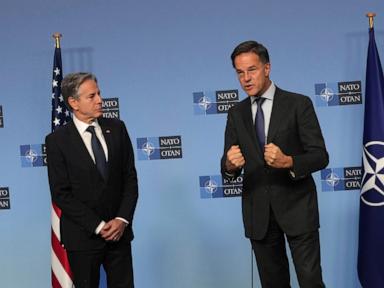Biden needs to Trump-proof US support for NATO, Ukraine

Former President Donald Trump’s clear mandate for the next four years is causing some anguish not only among the American coastal elite, but also in Europe, Iran and probably China.
It was not only high gas and housing prices and the Biden-Harris administration’s hapless immigration policy — which the White House only seriously addressed at the 11th hour — that alienated the majority of voters. It was also Vice President Kamala Harris’s inability, perhaps unwillingness to move too far from her San Francisco progressive past. She focused far too heavily on abortion, but not at all on the controversies surrounding transgender athletes in girls' sports. She said nothing at all about diversity, equity and inclusion programs in industry and academia.
And she did not, perhaps could not, distance herself from the Biden administration itself, including its national security policies and decisions — in which, according to Bob Woodward’s latest book, she was heavily involved.
Trump’s return to the White House has set off alarm bells overseas, most notably in Europe. He claims that he will bring about a settlement of the Ukraine conflicts upon taking office. Whether he is the reincarnation of Teddy Roosevelt — who won a Novel Peace Prize for mediating an end to the Russo-Japanese War — remains an open question.
Not surprisingly, given his unvarnished admiration for Vladimir Putin, Trump’s promise to bring a halt to the war in Ukraine has left Kyiv especially nervous. America’s Eastern European allies are worried as well.
Trump may well pressure Ukrainian President Volodymyr Zelensky to negotiate an agreement with Putin that costs Kyiv the loss of both Crimea and its four eastern oblasts. It is therefore incumbent on the Biden administration to strengthen Kyiv’s hand as much as possible prior to the start of any negotiations with Russia. That involves lifting all operational restrictions on European military support for Ukraine with weapons systems that include American parts. It also means both accelerating American military assistance to Ukraine funded, if necessary, by yet another emergency supplemental that must pass before the new administration takes office.
Even those European allies who are less committed to Ukraine are worried about America’s future role as NATO’s leading power. Trump has made no secret of his disdain for NATO states that do not allocate at least 3 percent of their GDP to their defense budgets, as opposed to their current 2 percent target, which some of them have yet to meet.
It be exceedingly difficult for America to leave NATO if the allies do not satisfy Trump’s demand. Congress passed a bipartisan amendment to the fiscal 2024 National Defense Authorization Act that would not allow the president to withdraw from NATO without obtaining the votes of two-thirds of the Senate. Such an outcome is exceedingly unlikely, even with Republican control of that body.
But Trump could pull America out of NATO’s integrated military command. If he did so, he would be following in the footsteps of Charles de Gaulle, who withdrew France from the command in 1966. An American withdrawal from NATO’s military structure would effectively emasculate the alliance and open the door to further Russian aggression, not only against a potentially rump Ukrainian state, but also against NATO’s Eastern European members.
Trump’s electoral victory has been welcomed in Israel. Jerusalem anticipates that it will have even more of a free hand prosecuting its wars against both Hamas and Hezbollah, though Trump has promised that he will resolve the Gaza crisis about as quickly as he does that of Ukraine.
Trump is likely to restore the “maximum pressure” sanctions he imposed on Iran during his previous term. Indeed, the ruling ayatollahs will have to tread far more carefully when planning any anew attacks on Israel. They can expect full-throated White House support, and possibly American military support, for any further and more devastating Israeli retaliation in response to new Iranian missile and drone attacks on the Jewish State.
Trump’s affinity for autocratic figures is not limited to Putin. He has maintained an excellent relationship with Hungary’s Viktor Orbán, Turkey’s Recep Tayyib Erdogan and India’s Narendra Modi. Orbán in particular will likely feel even more empowered to defy his NATO and EU partners both in terms of Hungary’s relations with Moscow and his less than fully democratic management of his country. He may cut back on his blossoming relationship with China, given Trump’s determination to impose new and higher tariffs on Beijing.
During the campaign, Trump made no secret of his romance with tariffs. His determination to raise tariffs to protect American industry is not limited to Chinese products, though that has tended to be his primary focus. Europeans can expect to be hit by American tariffs as well. So too might other Asian countries, possibly with negative implications for American national security. In particular, Vietnam is deeply concerned about the impact of tariffs on the many low-cost goods it exports to the U.S. Given Hanoi’s willingness to stand up to Chinese provocations in the South China Sea, perhaps the White House will push for less aggressive tariffs on Vietnamese products.
Trump and the Republican Party, which is now very much his own, have won a strong mandate from the American people. Whether the various ideas about which Trump mused during the campaign trail will ever come into being is an open question, since the man is by nature transactional. Moreover, as former Defense Secretary Bob Gates has said, “the enemy has a vote.”
One thing is certain, however. How America’s allies and adversaries choose to act may well result to their regret, since it almost certainly will trigger a strong — perhaps even devastating — response on the part of America’s 47th president.
Dov S. Zakheim is a senior adviser at the Center for Strategic and International Studies and vice chairman of the board for the Foreign Policy Research Institute. He was undersecretary of Defense (comptroller) and chief financial officer for the Department of Defense from 2001 to 2004 and a deputy undersecretary of Defense from 1985 to 1987.
Topics
-

Biden draws support — and GOP worry — in shift on US missiles in Ukraine war
Politics - The Hill - Yesterday -

NATO's Rutte calls for more Western support for Ukraine, warns of Russian alliances
World - ABC News - November 12 -
NATO chief calls for more support for Ukraine amid Russian pressure
World - Yahoo News - November 13 -

Hungary's Orbán predicts Trump will end US support for Ukraine
Politics - The Hill - November 8 -

Trump, Harris deeply divided over NATO, Ukraine
Politics - The Hill - October 28 -

Trump Will Test European Solidarity on NATO, Ukraine and Trade
World - The New York Times - November 7 -
Biden reiterates support for Ukraine while at G20 Summit
Top stories - CBS News - 2 days ago -
Biden reaffirms U.S. support for Ukraine at G20 summit
Top stories - CBS News - 2 days ago -

NATO and the EU press China to help stop North Korea's support for the war on Ukraine
World - ABC News - 6 days ago
More from The Hill
-

Will Trump be the president to end the ‘triple standard’ in the Middle East?
Politics - The Hill - 38 minutes ago -

Bill O'Reilly: Donald Trump Cabinet will have zero policy input
Politics - The Hill - 1 hour ago -

Will DOGE put spending on the chopping block?
Politics - The Hill - 1 hour ago -

Stephen A. Smith: Trump may have ulterior motive for Gaetz pick
Politics - The Hill - 1 hour ago -

What RFK Jr. could — and couldn't — do with vaccines as HHS chief
Politics - The Hill - 1 hour ago
